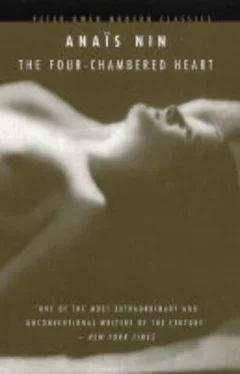Anaïs Nin - The Four-Chambered Heart
Здесь есть возможность читать онлайн «Anaïs Nin - The Four-Chambered Heart» весь текст электронной книги совершенно бесплатно (целиком полную версию без сокращений). В некоторых случаях можно слушать аудио, скачать через торрент в формате fb2 и присутствует краткое содержание. Год выпуска: 2004, ISBN: 2004, Издательство: Peter Owen Limited, Жанр: Классическая проза, Эротические любовные романы, на английском языке. Описание произведения, (предисловие) а так же отзывы посетителей доступны на портале библиотеки ЛибКат.
- Название:The Four-Chambered Heart
- Автор:
- Издательство:Peter Owen Limited
- Жанр:
- Год:2004
- ISBN:9780720611557
- Рейтинг книги:3 / 5. Голосов: 1
-
Избранное:Добавить в избранное
- Отзывы:
-
Ваша оценка:
- 60
- 1
- 2
- 3
- 4
- 5
The Four-Chambered Heart: краткое содержание, описание и аннотация
Предлагаем к чтению аннотацию, описание, краткое содержание или предисловие (зависит от того, что написал сам автор книги «The Four-Chambered Heart»). Если вы не нашли необходимую информацию о книге — напишите в комментариях, мы постараемся отыскать её.
The Four-Chambered Heart — читать онлайн бесплатно полную книгу (весь текст) целиком
Ниже представлен текст книги, разбитый по страницам. Система сохранения места последней прочитанной страницы, позволяет с удобством читать онлайн бесплатно книгу «The Four-Chambered Heart», без необходимости каждый раз заново искать на чём Вы остановились. Поставьте закладку, и сможете в любой момент перейти на страницу, на которой закончили чтение.
Интервал:
Закладка:
Djuna could never identify such a tide of faces dissolved by lights and shadows, slightly blurred in outlines from drink. But Rango could say immediately: “There’s a pimp, there’s a prizefighter. There’s a drug addict.”
Two friends of Rango’s walked in, with their hands in their pockets, greeted them obliquely, with heavy lids half dropped over glazed eyes. They had deep purple shadows under the eyes and Rango said: “It startles me to see my friends disintegrating so fast, even dying, from drugs. I’m no longer drawn to this kind of life.”
“You were drawn toward destruction before, weren’t you?”
“Yes,” said Rango, “but not really. When I was a young man, at home, what I liked most was health, physical energy and well-being. It was only later, here in Paris the poets taught me not to value life, that it was more romantic to be desperate, more noble to rebel, and to die, than to accept what ordinary life had to offer. I’m not drawn to that any more. I want to live. That was not the real me. Zora says you changed me, yet I can’t think of anything you said or did to accomplish it. But every time we are together I want to accomplish something, something big. I don’t want any more of this literary credo, about the romantic beauty of living desperately, dangerously, destructively.”
Djuna thought with irony that she had not meant to give birth to a rebel. She had changed, too, because of Rango. She had acquired some of his gypsy ways, some of his nonchalance, his bohemian indiscipline. She had swung with him into the disorders of strewn clothes, spilled cigarette ashes, slipping into bed all dressed, falling asleep thus, indolence, timelessness… A region of chaos and moonlight. She liked it there. It was the atmosphere of earth’s womb, where awareness could not reach and illumine all the tragic aspects of unfulfilled desires. In the darkness, chaos, warmt one forgot… And the silence. She liked the silence most of all. The silence in which the body, the senses, the instincts, are more alert, more powerful, more sensitized, live a more richly perfumed and intoxicating life, instead of transmuting into thoughts, words, into exquisite abstractions, mathematics of emotion in place of the violent impact, the volcanic eruptions of fever, lust, and delight.
Irony. Now Rango was projecting himself out of this realm, and wanted action. No more time for the guitar which had ensorcelled her, no more time to visit the gypsies as he had once promised, no more time to sleep in the morning as she had been learning, or to acquire by osmosis his art of throwing off responsibilities, his self-indulgence, his recklessness…
As they sat in the cafe, he condemned his past life. He was full of contrition for the wasted hours, the wasted energy, the wasted years. He wanted a more austere life, action and fulfillment.
Suddenly Djuna looked down at her coffee and her eyes filled with stinging tears; the tears of irony burn the skin more fiercely. She wept because she had aroused in Rango the desire to serve a purpose which was not hers, to live now for others when already he lived for Zora, and had so little to give her of himself. She wept because they were so close in that earthy darkness, close in the magnetic pull between their skins, their hair, their bodies, and yet their dreams never touched at any point, their vision of life, their attitudes. She wept over the many dislocations of life, forbidding the absolute unity.
Rango did not understand.
In the realm of ideas he was always restless, impatient, and like some wild animal who feared to be corralled. He often described how the horses, the bulls, were corralled in his ranch. He delighted in the fierceness of the battle. For him to examine, to understand, to interpret was exactly like some corralling activity, of which he was suspicious.
But for the moment, she was breathing the odor of his hair. For the moment there was this current between their skin and flesh, these harmonizations of contrasting colors, weight, quality, odors. Everything about him was pungent and violent. They were as his friends said, like Othello and Desdemona.
Manana he would be a party member.
When you lose your wings, thought Djuna, this is the way you live. You buy candles for the meeting of Rango’s friends, but these candles do not give a light that will delight you, because you do not believe in what you are doing.
Sadness never added to her weight; it caught her in flight as she danced in spirals misplacing air pools like an arrow shot at a bird which did not bring it down but merely increased its flutterings.
She had every day a greater reluctance to descend into familiar daily life, because the hurt, the huntsman’s bow, came from the earth, and therefore flight at a safe distance became more and more imperative.
Her mobility was now her only defense against new dangers. While you’re in movement it is harder to be shot at, to be wounded even. She had adopted the basic structure of the nomads.
Rango had said: “Prepare the barge for a meeting tonight. It will be an ideal place. No superintendents to tell tales to the police. No neighbors.”
He had signed all the papers. They must be more careful. The barge was being put to a greater usefulness.
There are two realms to live in now. (Do I hold the secret drug which permits me to hold on to the ecstasies while entering the life of the world, activities in the world, contingencies? I feel it coming to me while I am walking. It is a strange sensation, like drunkenness. It catches me in the middle of the street like a tremendous wave, and a numbness passes through my veins which is the numbness of the marvelous. I know it by its power, by the way it lifts my body, the air which passes under my feet. The cold room I left in the morning, the drab bed covers, the stove full of ashes, the sour wine at the bottom of the glass were all illuminated by the force of love for Rango. It was as if I had learned to fly over the street and were permitted to do so for an instant…making every color more intense, every caress more penetrating, every moment more magnificent… But I knew by the anxiety that it might not last. It is a state of grace of love, which some achieve by wine and others by prayer and fasting. It is a state of grace but I cannot discover what makes one fall out of it. The danger lies in flying low, in awakening. She knew she was flying lower now that Rango was to act in the world. The air of politics was charged with dust. People aspired to reach the planets, but it was a superfluous voyage; there was a certain way of breathing, of walking, of seeing, which transported human beings into space, into transparency. The extraordinary brilliancy of the games people played beyond themselves, the games of their starry selves…)
She bought wood for the fire. She swept the barge. She concealed the bed and the barrel of wine.
Rango would guide the newcomers to the barge, and remain on the bridge to direct them.
The Guatemalans arrived gradually. The darker Indian-blooded ones in Indian silence, the paler Spanish-blooded ones with Spanish volubility. But both were intimidated by the place, the creaking wood, the large room resembling the early meeting places of the revolutionaries, the extended shadows, the river noises, chains, oars, the disquieting lights from the bridge, the swaying when other barges passed. Too much the place for conspirators. At times life surpasses the novel, the drama. This was one of them. The setting was more dramatic than they wished. They stood awkwardly around.
Rango had not yet come. He was waiting for those who were late.
Djuna did not know what to do. This was a role for which she had no precedent. Politeness or marginal talk seemed out of place. She kept the stove filled with wood and watched the flames as if her guardianship would make them active.
Читать дальшеИнтервал:
Закладка:
Похожие книги на «The Four-Chambered Heart»
Представляем Вашему вниманию похожие книги на «The Four-Chambered Heart» списком для выбора. Мы отобрали схожую по названию и смыслу литературу в надежде предоставить читателям больше вариантов отыскать новые, интересные, ещё непрочитанные произведения.
Обсуждение, отзывы о книге «The Four-Chambered Heart» и просто собственные мнения читателей. Оставьте ваши комментарии, напишите, что Вы думаете о произведении, его смысле или главных героях. Укажите что конкретно понравилось, а что нет, и почему Вы так считаете.












